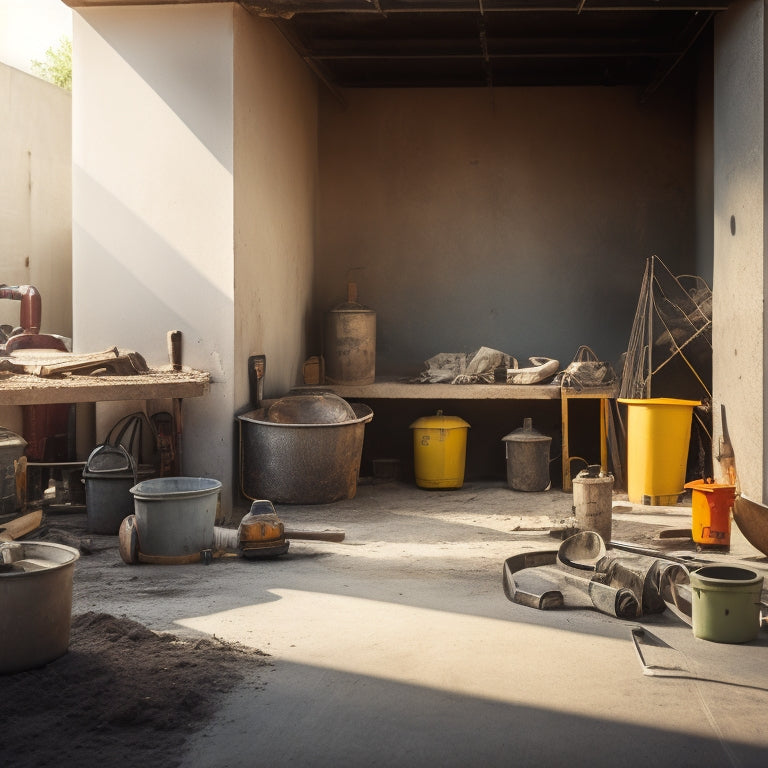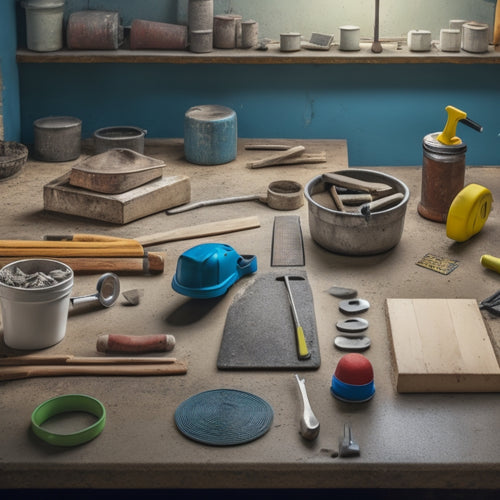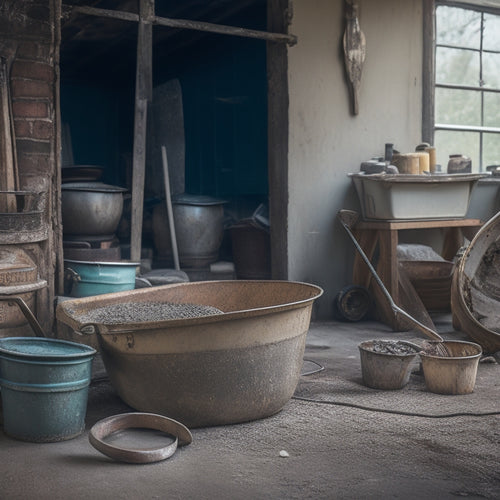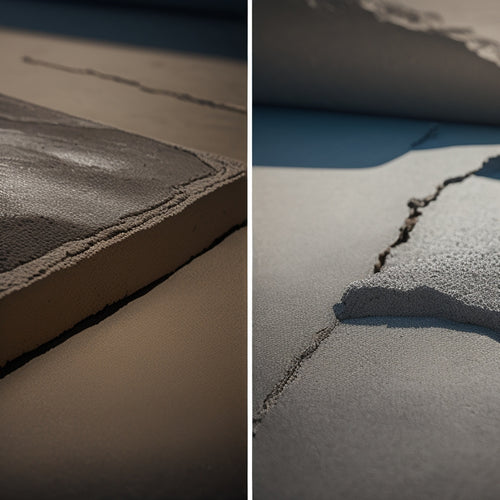
What Tools Do I Need for Concrete Walls
Share
You'll need a range of tools to complete a concrete wall project, including essential mixing tools like buckets and measuring cups, specialized finishing tools such as trowels and floats, and safety gear like goggles and gloves. Measuring and testing equipment, like laser levels and slump cones, will also come in handy. Power tools, including impact drills and demolition hammers, will increase efficiency and precision. With the right tools, you'll be well on your way to achieving a high-quality concrete wall. As you prepare for your project, you'll discover the importance of each tool and how to use them to achieve excellent results.
Key Takeaways
• Essential concrete mixing tools, including a sturdy mixing bucket and reliable mixing stick, are necessary for consistency and quality.
• Specialized finishing tools, such as trowels and floats, help achieve a high-quality finish and smooth surfaces.
• Safety gear, including goggles, gloves, and a dust mask, is crucial for protecting yourself from hazards and chemicals.
• Measuring and testing equipment, like laser levels and slump cones, ensure accuracy and quality control in your concrete work.
• Power tools, such as impact drills and rotary hammers, increase efficiency and precision in concrete construction projects.
Essential Concrete Mixing Tools
You'll need a set of essential concrete mixing tools to achieve the right consistency and quality of your concrete mixture. A sturdy mixing bucket or drum, a reliable mixing stick or paddle, and a set of measuring cups and scoops are must-haves. These tools will help you master various mixing techniques, from slow and gentle folding to fast and aggressive blending, depending on the specific requirements of your project.
Regular tool maintenance is vital to guarantee peak performance and extend the lifespan of your equipment. Clean your mixing tools thoroughly after each use, and store them in a dry place to prevent rust or corrosion. Lubricate moving parts, such as the mixing paddle's axis, to reduce friction and wear.
Specialized Tools for Finishing
As you move on to the finishing stage of your concrete wall project, specialized tools become essential for achieving a smooth, even, and visually appealing surface. At this stage, you'll need to focus on refining the surface, removing imperfections, and applying finishing products to enhance the appearance of your wall.
To master trowel techniques, you'll require a range of specialized tools, including:
-
A finishing trowel with a curved or flat blade, designed for applying and smoothing out finishing products.
-
An edger or margin trowel, used for creating clean edges and corners.
-
A float, which helps to remove excess material and create a smooth surface.
These tools will enable you to achieve a high-quality finish, whether you're applying a simple coat of paint or a more complex decorative finish.
Safety Gear for Concrete Work
Before applying finishing products, don your personal protective equipment (PPE) to safeguard yourself from the hazards inherent in concrete work.
Safety goggles are a must-have to prevent eye damage from flying debris, chemical splashes, or other accidents. Make sure they fit snugly and provide unobstructed vision.
Sturdy gloves will protect your hands from abrasions, cuts, and punctures. Look for gloves with grip patterns to improve dexterity and prevent slips.
In addition to safety goggles and gloves, wear a dust mask or respirator to prevent inhaling airborne concrete particles.
A hard hat and steel-toed boots will provide additional protection from falling objects or heavy tools.
Don't forget to wear long sleeves, long pants, and a breathable, lightweight jacket to prevent skin irritation and excessive heat buildup.
Measuring and Testing Equipment
Accurate measurements and tests are essential to achieving a high-quality finish on concrete walls, and a range of specialized tools helps you achieve this goal.
You'll need to guarantee that your walls are level, plumb, and square, and that the concrete is mixed to the correct consistency. To do this, you'll rely on measuring and testing equipment that provides precise readings and accurate results.
Some of the key tools you'll need include:
-
Laser levels to check the wall's levelness and plumbness
-
Spirit levels to guarantee the wall is square
-
Concrete testing equipment, such as slump cones and density testers, to evaluate the concrete's consistency and strength.
Power Tools for Faster Construction
You'll considerably reduce construction time and increase efficiency by utilizing power tools specifically designed for concrete wall construction, which enable you to perform tasks faster and with greater precision. These tools are essential for drilling, breaking, and shaping concrete, allowing you to complete projects quickly and accurately.
| Tool | Function | Benefits |
|---|---|---|
| Impact Drills | Drilling holes for anchor bolts and rebar | Faster drilling, increased torque, and reduced operator fatigue |
| Demolition Hammers | Breaking up concrete for demolition or renovation | Increased power, reduced vibration, and improved control |
| Rotary Hammers | Drilling and chiseling concrete for various applications | Versatility, precision, and reduced downtime |
When selecting power tools for concrete wall construction, consider the specific tasks you need to perform and the type of concrete you're working with. Impact drills, for example, are ideal for drilling holes for anchor bolts and rebar, while demolition hammers are better suited for breaking up concrete for demolition or renovation. By choosing the right power tools for the job, you'll be able to work more efficiently and effectively, ensuring a high-quality finish and reducing the risk of errors or accidents.
Frequently Asked Questions
Can I Use a Regular Drill for Concrete Mixing and Finishing?
You're wondering if you can use a regular drill for concrete mixing and finishing. The short answer is no, you can't.
A regular drill lacks the power and torque needed for mixing and finishing concrete. You'll need specialized drill types, such as a hammer drill or rotary hammer, designed for heavy-duty concrete work.
Additionally, mixing tools like a paddle mixer or a mixing bucket with a heavy-duty drill bit are essential for efficient and effective concrete mixing and finishing.
How Do I Prevent Concrete From Sticking to My Tools?
When working with concrete, you'll want to prevent it from sticking to your tools to guarantee efficient and effective mixing and finishing.
To do this, make sure to thoroughly clean your tools regularly, removing any dried concrete residue.
Additionally, apply adhesive solutions, such as silicone sprays or concrete release agents, to your tools before use.
This will create a barrier, allowing concrete to release easily and preventing it from sticking to your tools.
What Is the Ideal Temperature for Pouring Concrete Walls?
When pouring concrete walls, you'll want to guarantee ideal pouring conditions.
Temperature plays a vital role, as it affects the concrete's setting time, strength, and overall quality. Aim for a temperature between 50°F and 75°F (10°C and 24°C) for best results.
If it's too hot, the concrete may set too quickly, leading to weaknesses.
If it's too cold, the setting process will slow down, potentially causing delays.
Can I Use Concrete With High Water Content for Walls?
Imagine a weak link in a sturdy chain - that's what high water content concrete can be for your walls.
You're fundamentally diluting the strength of your concrete by adding excess water, compromising the water-cement ratio.
This can lead to reduced wall durability and increased porosity, making it more susceptible to cracks and damage.
It's vital to maintain an ideal water-cement ratio to guarantee your walls stand the test of time.
Do I Need to Add Reinforcement to a Small Concrete Wall?
When building a small concrete wall, you'll need to take into account adding reinforcement to guarantee wall stability.
You have options for reinforcement types, including rebar, fiber mesh, and wire mesh. Rebar provides strength in both directions, while fiber mesh and wire mesh offer added tensile strength.
You'll want to assess the load-bearing requirements of your wall and choose the right reinforcement to prevent cracking and collapse.
Don't skip this vital step, as it's essential for a durable and long-lasting structure.
Conclusion
As you stand before your concrete wall project, remember that having the right tools is half the battle.
Don't be like a shipwrecked sailor, lost at sea without a compass - be prepared with the essentials: mixing tools, finishing tools, safety gear, measuring equipment, and power tools.
With these in your arsenal, you'll be unstoppable, constructing walls that are as strong as your determination to succeed.
The concrete jungle won't know what hit it!
Related Posts
-

Must-Have Tools for Laying Concrete Tiles
When laying concrete tiles, you'll need a range of essential tools to get the job done right. Start with subfloor pre...
-

Top Tools for Mixing Concrete at Home
When mixing concrete at home, you'll need a range of tools to guarantee a successful operation. Start with essential ...
-

What Tools Ensure Strong Concrete Adhesion at Home
You'll need the right tools to guarantee strong concrete adhesion at home. For surface preparation, use concrete surf...


